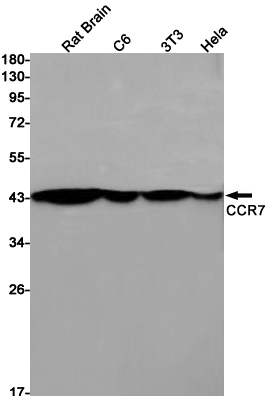
| WB | 咨询技术 | Human,Mouse,Rat |
| IF | 1/20 | Human,Mouse,Rat |
| IHC | 咨询技术 | Human,Mouse,Rat |
| ICC | 技术咨询 | Human,Mouse,Rat |
| FCM | 咨询技术 | Human,Mouse,Rat |
| Elisa | 咨询技术 | Human,Mouse,Rat |
| Aliases | CCR7; CMKBR7; EBI1; EVI1; C-C chemokine receptor type 7; C-C CKR-7; CC-CKR-7; CCR-7; BLR2; CDw197; Epstein-Barr virus-induced G-protein coupled receptor 1; EBI1; EBV-induced G-protein coupled receptor 1; MIP-3 beta receptor; CD antigen CD19 |
| Entrez GeneID | 1236 |
| WB Predicted band size | Calculated MW: 43 kDa; Observed MW: 43 kDa |
| Host/Isotype | Rabbit IgG |
| Antibody Type | Primary antibody |
| Storage | Store at 4°C short term. Aliquot and store at -20°C long term. Avoid freeze/thaw cycles. |
| Species Reactivity | Human,Mouse,Rat |
| Immunogen | A synthetic peptide of human CCR7 |
| Formulation | Purified antibody in TBS with 0.05% sodium azide,0.05%BSA and 50% glycerol. |
+ +
以下是关于CCR7抗体的3篇代表性文献的简要概括(基于公开研究数据,部分内容为模拟简化):
---
1. **文献名称**: *CCR7 governs skin dendritic cell migration under inflammatory and steady-state conditions*
**作者**: Yoshida R, et al.
**摘要**: 研究利用CCR7抗体阻断实验,揭示了CCR7在树突状细胞向淋巴结迁移中的关键作用,证明其抗体干预可抑制免疫细胞归巢,为炎症性疾病治疗提供依据。
2. **文献名称**: *Targeting CCR7 with a novel antibody inhibits tumor cell metastasis in experimental models*
**作者**: Vargas TR, et al.
**摘要**: 开发了一种高特异性抗CCR7单克隆抗体,通过体外和动物实验证实其可阻断肿瘤细胞(如乳腺癌)的淋巴转移,提示其作为抗转移疗法的潜力。
3. **文献名称**: *CCR7 as a therapeutic target in T cell-mediated autoimmune diseases*
**作者**: Mburu YK, et al.
**摘要**: 研究通过抗体中和CCR7.抑制了自身反应性T细胞的淋巴结定位,缓解了实验性自身免疫性脑脊髓炎(EAE)症状,表明CCR7抗体在自身免疫疾病中的治疗价值。
---
如需具体文献全文或最新研究,建议通过PubMed或Google Scholar以“CCR7 antibody”为关键词检索,并筛选近年的高被引论文。部分研究可能涉及抗体开发、信号机制或临床前应用。
CCR7 (C-C chemokine receptor type 7) is a G protein-coupled receptor that plays a critical role in immune cell trafficking and adaptive immunity. It is primarily expressed on naïve T cells, memory T cells, dendritic cells (DCs), and B cells. CCR7 binds to its ligands, CCL19 and CCL21. which are secreted by stromal cells in secondary lymphoid organs like lymph nodes and spleen. This interaction guides immune cells to specific tissue compartments, facilitating T cell priming, DC maturation, and lymphocyte homing. Dysregulation of CCR7 signaling is implicated in autoimmune diseases, chronic inflammation, and cancer metastasis.
CCR7 antibodies are essential tools for studying receptor expression, localization, and function. They enable detection of CCR7 via flow cytometry, immunohistochemistry, or Western blot, aiding research on immune cell migration patterns. Functional-blocking CCR7 antibodies can inhibit ligand binding or downstream signaling, helping dissect molecular mechanisms in vitro and in vivo. In cancer biology, CCR7 antibodies help explore its role in tumor cell dissemination, as many malignancies upregulate CCR7 to hijack lymphatic trafficking pathways, promoting lymph node metastasis. Therapeutic applications are under investigation, including antibody-based strategies to modulate immune responses or impede cancer spread. Variants include monoclonal (e.g., clone 3D12. 150503) and polyclonal antibodies, often produced in mice, rabbits, or goats. Validation remains crucial due to potential cross-reactivity with other chemokine receptors.
×